中考复习 现在完成时
图片预览
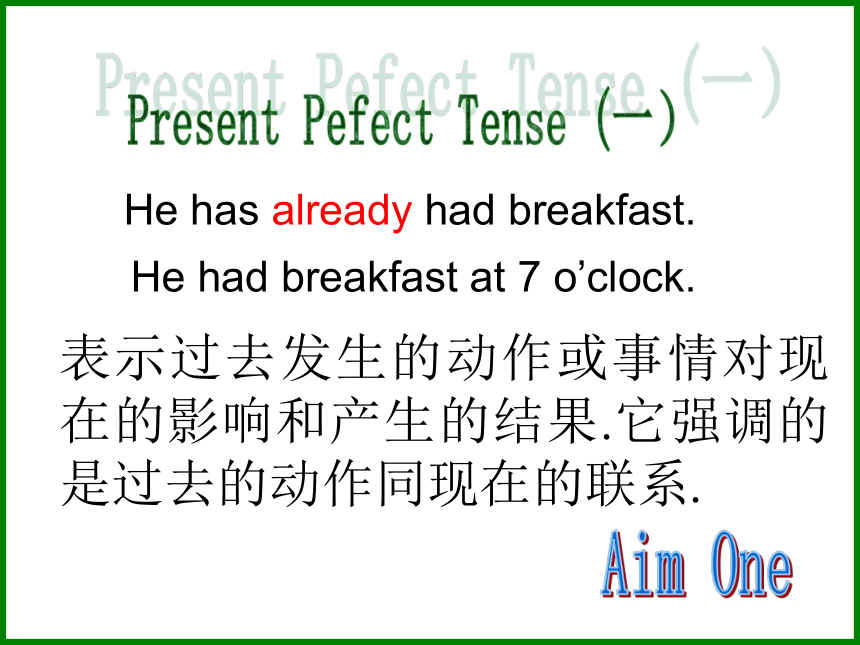
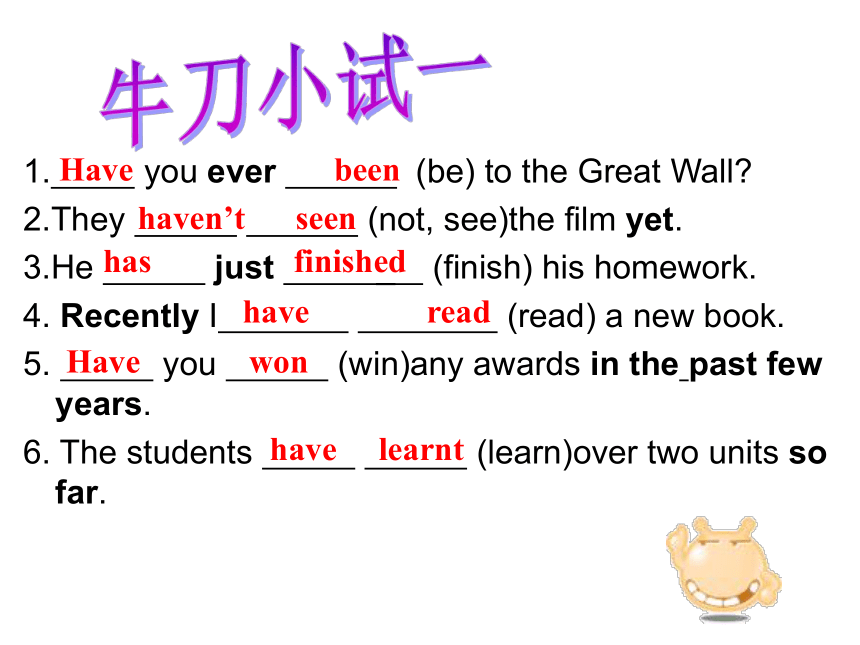
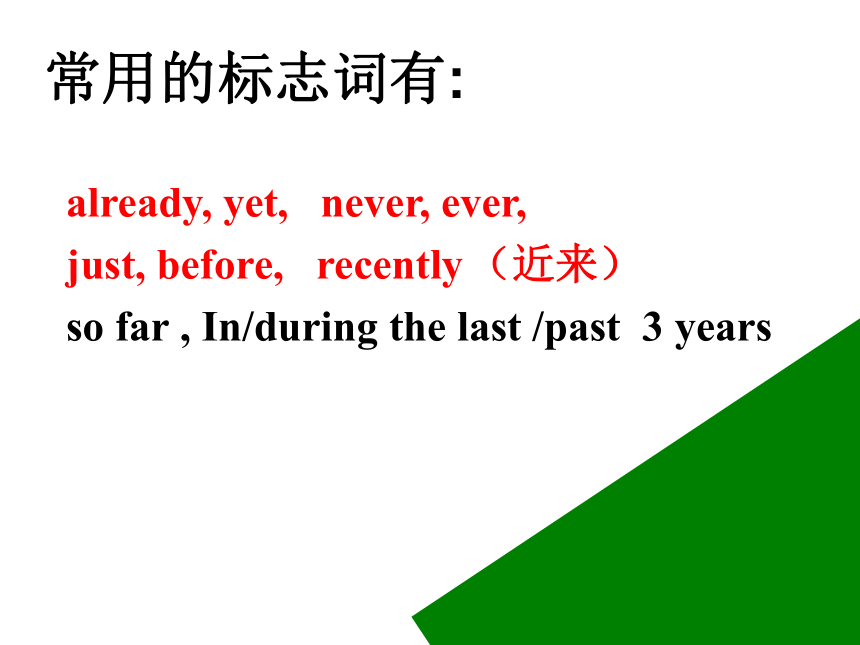
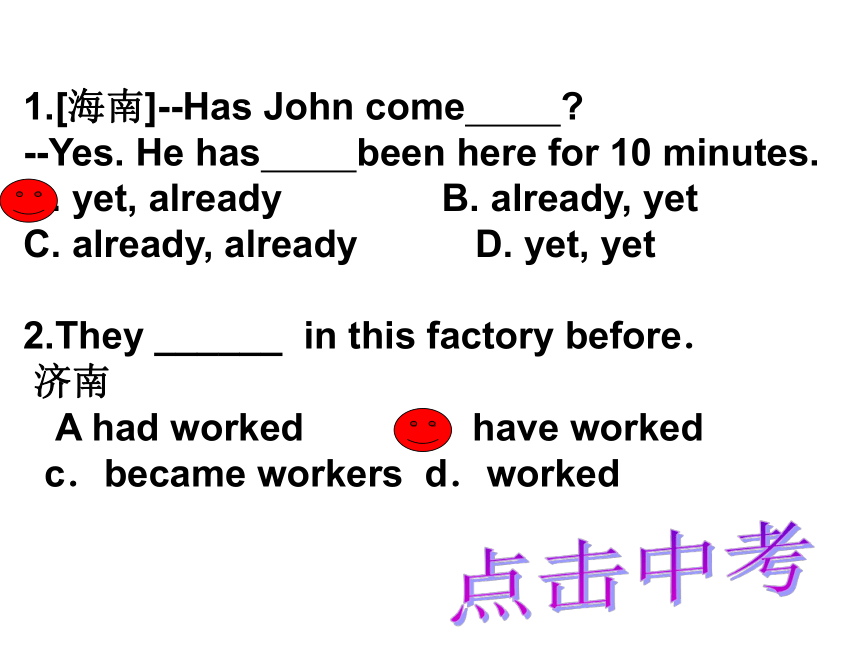
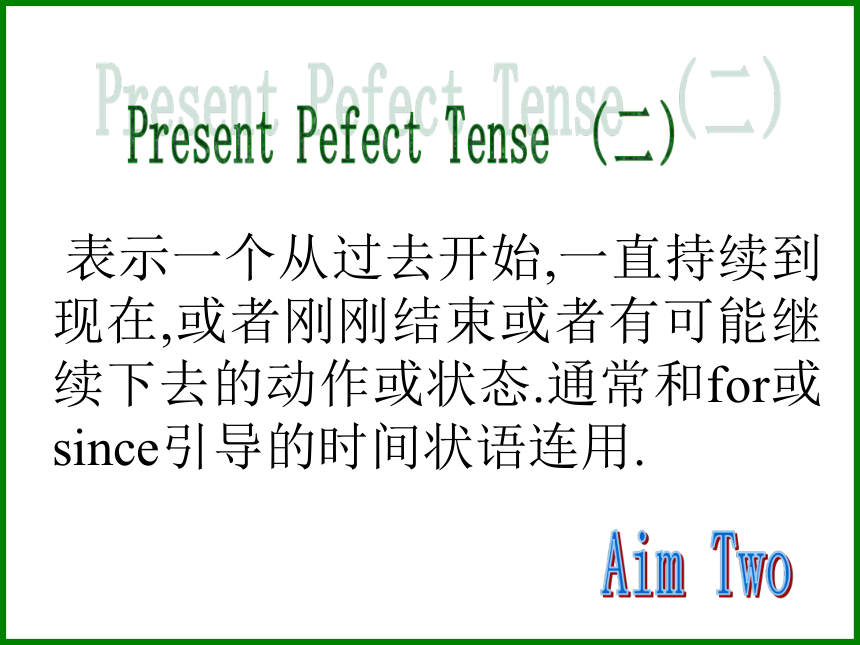
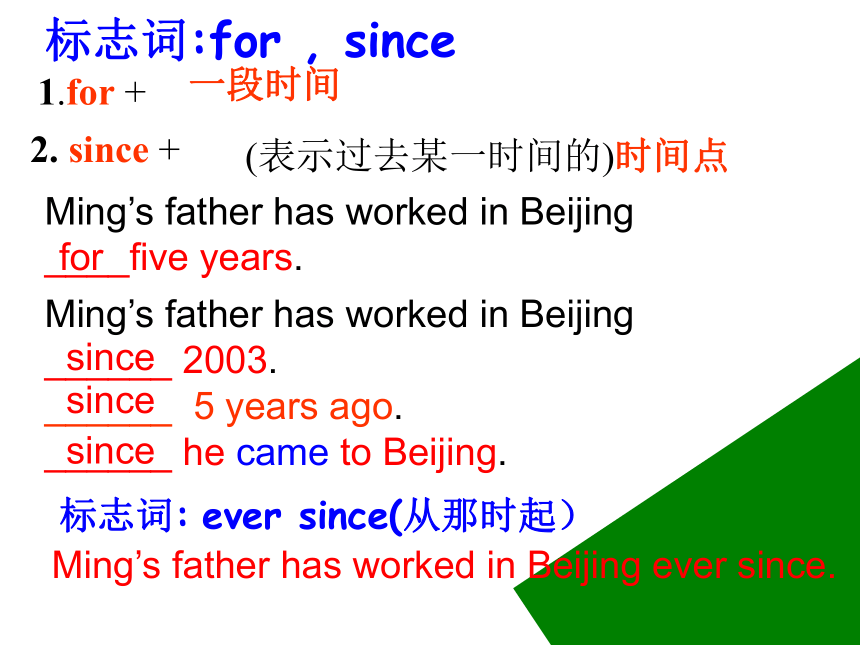
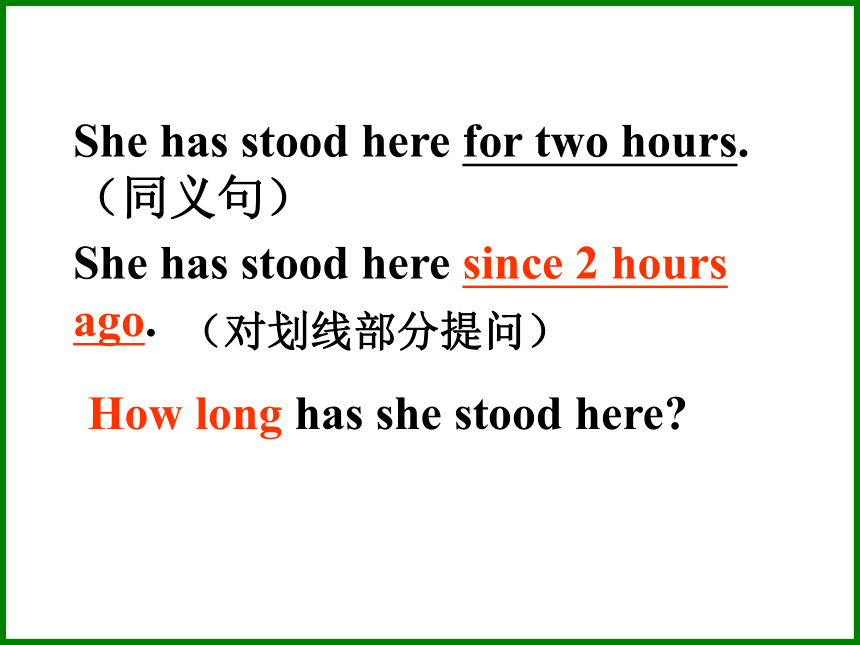
文档简介
课件19张PPT。表示过去发生的动作或事情对现在的影响和产生的结果.它强调的是过去的动作同现在的联系.Present Pefect Tense (一)He has already had breakfast.He had breakfast at 7 o’clock.Aim One
1. you ever (be) to the Great Wall?
2.They (not, see)the film yet.
3.He just _ (finish) his homework.
4. Recently I (read) a new book.
5. you (win)any awards in the past few years.
6. The students (learn)over two units so far.have readHave wonhave learntHave been has finishedhaven’t seen牛刀小试一常用的标志词有:already, yet, never, ever,
just, before, recently (近来)
so far , In/during the last /past 3 years
1.[海南]--Has John come???????? ?
--Yes. He has???????? been here for 10 minutes.
A. yet, already?????????????? B. already, yet
C. already, already????????? ?D. yet, yet
2.They ______ in this factory before.
济南
A had worked b.have worked
c.became workers d.worked
点击中考?
表示一个从过去开始,一直持续到现在,或者刚刚结束或者有可能继续下去的动作或状态.通常和for或since引导的时间状语连用.
Present Pefect Tense (二)Aim Two1.for +
一段时间Ming’s father has worked in Beijing
____five years.
标志词:for , since 2. since +
(表示过去某一时间的)时间点Ming’s father has worked in Beijing
______ 2003.
______ 5 years ago.
______ he came to Beijing.
标志词: ever since(从那时起)forsincesincesinceMing’s father has worked in Beijing ever since.She has stood here since 2 hours ago.How long has she stood here?She has stood here for two hours.(同义句)(对划线部分提问)1. Diana (be) in Shanghai for three days.
2. I (not, see) you for a long time.
3. Great changes (take) place in Shanghai since 1983.
4.Harry Potter (live) in a very small room since his parents______(die).
5.---How long you (work) here?
---I here for an hour.has beenhaven’t seenhave takenhas livedhave worked have workeddied牛刀小试二1.[甘肃]--???????? you???????? your homework yet?
--Yes, I???????? it a moment ago.
A. Did, do, finished?????B. Have, done, have finished
C. Have, done, finished??????D. Will, do, finish
2. [海南] -Ann has gone to Shanghai.
-So ______her parents.
has B. had C. did D. have
3.[济南]The foreign teachers have worked in that
school???????? last year.
A. since?????B. when ?????? C. before???????D. until
点击中考Have been to, have gone to, have been in 1.He ____________ Beijing twice.
2. He is not here, he __________ Shanghai.
3.The Kings ____________ Hawaii for 20years. has been to has gone to have been in 火眼金睛Aim Three1Jim______the Great Wall many times.
(厦门市)
a.went to b.goes to
c.has gone to d.has been to
2—Where is your father?We haven't seen
each other for weeks. —______ .(济南市)
?? a.He has been to America
?? b.He has gone to England
?? c.He is going to Australia
?? d.He would visit my grandparents
3— ______ to the United States ?
??? —No,never,but I went to Canada a few years ago.(山西省)
a.Have you been b.Have you gone
c.Did you go d.Will you go点击中考
Eg. I have left Beijing for 5 years.
(正)I have been away from
Beijing for 5 years. 注: 短暂性动词不能和for或since
引导的时间状语连用, 当然也不能用
于how long引导的问句中.
(误)火眼金睛辨正误※短暂性动词与延续动词间的转换
难点突破!come/go (to)
arrive (at/in)
get (to)
reach
start/begin--
die--
open--
return--
become--小自测leave--buy--borrow--
join--
他爷爷五年前去世的。
His grandpa 5 years ago .
他爷爷去世已有5年了。
His grandpa for 5 years.
It 5 years since his grandpa .
has been deadis died died瞬间动词和延续性动词、状态句型转化Aim Four1.You are late. The film began 10 minutes ago .
A: You are late. The film for 10 minutes.
B: You are late. It ten minutes since the film .
2. My uncle joined the army 2 years ago.
A: My uncle the army for 2 years.
B: It 2 years my uncle joined the army.
3. The train left 20 minutes ago .
A: You’re late. The train for 20 minutes.
B: It 20 minutes since the train .has been onisbegan/startedhas been inissince has been away isleft挑战自我句式转换
have/has done(延续动词)+ 一段时间
小结短暂(非延续)动词的一般过去时 + 时间状语It is +一段时间+since+句子(一般过去时)1.—I'm sorry,Cathy,I______
your radio for such a long time.
?? —Never mind.(北京市东城区)
a.have borrowed b.have lent
c.have kept d.have returned
2. —When______ you______ this book?
?? —I______ it for two weeks.(2001青岛市)
a.have,bought;have had
b.did,buy;have had
c.have,bought;bought
d.did,buy;have bought
3. It ______ ten years since they ______ to France.
(河北省)
a.was,moved b.was,have moved
c.is,have moved d.is,moved 点击中考Present Pefect TenseHave/has been to
Have has gone to
Have/has been in
1. you ever (be) to the Great Wall?
2.They (not, see)the film yet.
3.He just _ (finish) his homework.
4. Recently I (read) a new book.
5. you (win)any awards in the past few years.
6. The students (learn)over two units so far.have readHave wonhave learntHave been has finishedhaven’t seen牛刀小试一常用的标志词有:already, yet, never, ever,
just, before, recently (近来)
so far , In/during the last /past 3 years
1.[海南]--Has John come???????? ?
--Yes. He has???????? been here for 10 minutes.
A. yet, already?????????????? B. already, yet
C. already, already????????? ?D. yet, yet
2.They ______ in this factory before.
济南
A had worked b.have worked
c.became workers d.worked
点击中考?
表示一个从过去开始,一直持续到现在,或者刚刚结束或者有可能继续下去的动作或状态.通常和for或since引导的时间状语连用.
Present Pefect Tense (二)Aim Two1.for +
一段时间Ming’s father has worked in Beijing
____five years.
标志词:for , since 2. since +
(表示过去某一时间的)时间点Ming’s father has worked in Beijing
______ 2003.
______ 5 years ago.
______ he came to Beijing.
标志词: ever since(从那时起)forsincesincesinceMing’s father has worked in Beijing ever since.She has stood here since 2 hours ago.How long has she stood here?She has stood here for two hours.(同义句)(对划线部分提问)1. Diana (be) in Shanghai for three days.
2. I (not, see) you for a long time.
3. Great changes (take) place in Shanghai since 1983.
4.Harry Potter (live) in a very small room since his parents______(die).
5.---How long you (work) here?
---I here for an hour.has beenhaven’t seenhave takenhas livedhave worked have workeddied牛刀小试二1.[甘肃]--???????? you???????? your homework yet?
--Yes, I???????? it a moment ago.
A. Did, do, finished?????B. Have, done, have finished
C. Have, done, finished??????D. Will, do, finish
2. [海南] -Ann has gone to Shanghai.
-So ______her parents.
has B. had C. did D. have
3.[济南]The foreign teachers have worked in that
school???????? last year.
A. since?????B. when ?????? C. before???????D. until
点击中考Have been to, have gone to, have been in 1.He ____________ Beijing twice.
2. He is not here, he __________ Shanghai.
3.The Kings ____________ Hawaii for 20years. has been to has gone to have been in 火眼金睛Aim Three1Jim______the Great Wall many times.
(厦门市)
a.went to b.goes to
c.has gone to d.has been to
2—Where is your father?We haven't seen
each other for weeks. —______ .(济南市)
?? a.He has been to America
?? b.He has gone to England
?? c.He is going to Australia
?? d.He would visit my grandparents
3— ______ to the United States ?
??? —No,never,but I went to Canada a few years ago.(山西省)
a.Have you been b.Have you gone
c.Did you go d.Will you go点击中考
Eg. I have left Beijing for 5 years.
(正)I have been away from
Beijing for 5 years. 注: 短暂性动词不能和for或since
引导的时间状语连用, 当然也不能用
于how long引导的问句中.
(误)火眼金睛辨正误※短暂性动词与延续动词间的转换
难点突破!come/go (to)
arrive (at/in)
get (to)
reach
start/begin--
die--
open--
return--
become--小自测leave--buy--borrow--
join--
他爷爷五年前去世的。
His grandpa 5 years ago .
他爷爷去世已有5年了。
His grandpa for 5 years.
It 5 years since his grandpa .
has been deadis died died瞬间动词和延续性动词、状态句型转化Aim Four1.You are late. The film began 10 minutes ago .
A: You are late. The film for 10 minutes.
B: You are late. It ten minutes since the film .
2. My uncle joined the army 2 years ago.
A: My uncle the army for 2 years.
B: It 2 years my uncle joined the army.
3. The train left 20 minutes ago .
A: You’re late. The train for 20 minutes.
B: It 20 minutes since the train .has been onisbegan/startedhas been inissince has been away isleft挑战自我句式转换
have/has done(延续动词)+ 一段时间
小结短暂(非延续)动词的一般过去时 + 时间状语It is +一段时间+since+句子(一般过去时)1.—I'm sorry,Cathy,I______
your radio for such a long time.
?? —Never mind.(北京市东城区)
a.have borrowed b.have lent
c.have kept d.have returned
2. —When______ you______ this book?
?? —I______ it for two weeks.(2001青岛市)
a.have,bought;have had
b.did,buy;have had
c.have,bought;bought
d.did,buy;have bought
3. It ______ ten years since they ______ to France.
(河北省)
a.was,moved b.was,have moved
c.is,have moved d.is,moved 点击中考Present Pefect TenseHave/has been to
Have has gone to
Have/has been in
同课章节目录
- 词法
- 名词
- 动词和动词短语
- 动词语态
- 动词时态
- 助动词和情态动词
- 非谓语动词
- 冠词
- 代词
- 数词和量词
- 形容词副词及其比较等级
- 介词和介词短语
- 连词和感叹词
- 构词法
- 相似、相近词比较
- 句法
- 陈述句
- 一般疑问句和否定疑问句
- 特殊疑问句及选择疑问句
- 反意疑问句
- 存在句(There be句型)
- 宾语从句
- 定语从句
- 状语从句
- 主谓一致问题
- 简单句
- 并列句
- 复合句
- 主谓一致
- 主、表语从句
- 名词性从句
- 直接引语和间接引语
- 虚拟语气
- 感叹句
- 强调句
- 倒装句
- 祈使句
- 句子的成分
- 句子的分类
- 题型专区
- 单项选择部分
- 易错题
- 完形填空
- 阅读理解
- 词汇练习
- 听说训练
- 句型转换
- 补全对话
- 短文改错
- 翻译
- 书面表达
- 任务型阅读
- 语法填空
- 其他资料
